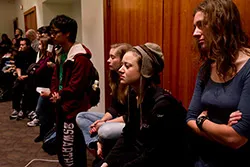Watch: Moral Differences between Liberals and Conservatives
On November 4, 2012, the moral differences between liberals and conservatives was the timely topic of discussion at a pre-election installment of the The Righteous Mind symposia. All of the panelists reflected that they enjoyed reading the book and engaging with Haidt's ideas, even as they each employed their own academic training to critique The Righteous Mind.

Barry Schwartz, Dorwin P. Cartwright Professor of Social Theory and Social Action and professor of psychology, and one of the organizers of the event, provided an overview of Haidt's arguments to prepare the audience for the conversation. Rich Schuldenfrei, professor emeritus of philosophy, began the discussion by introducing Haidt's case that sacredness, merit, authority, and loyalty are valued as moral principles more by conservatives than by liberals. For an anthropological perspective, Associate Professor Farha Ghannam weighed in on Haidt's reliance on the concept of human nature shaping our political bias.
Ben Berger, associate professor of political science, questioned Haidt's methodology, suspecting that Haidt is capturing how people perceive they should act, rather than their true beliefs. Berger noted that fear of social pressure may impact reporting and that what Haidt is capturing may be less genetic and more memetic. Carol Nackenoff, Richter Professor of political science wondered how we could have ever had consensus in this country if liberals and conservatives are as different as Haidt makes them out to be.
The symposia events have been made possible with funding and administrative support from the Swarthmore College Institute for the Liberal Arts. The Institute aims to foster curricular, pedagogical, and scholarly innovation; to engage in generative thinking about the future of the liberal arts and higher education; and to facilitate conversations between liberal arts institutions and those who live liberal arts lives.



